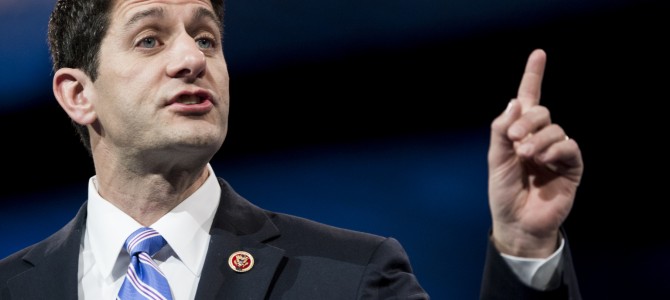
House Speaker Paul Ryan announced Thursday he’ll be voting for Donald Trump in November. In an op-ed column that falls somewhat short of a full-throated endorsement, Ryan talked about how the House has a plan to reform the tax code, replace Obamacare, and restore the Constitution, among other things, and that Trump could help get that agenda passed into law.
Ryan’s main point was that “if we’re going to unite, it has to be over ideas.” He says he and Trump have talked about how, “by focusing on issues that unite Republicans, we can work together to heal the fissures developed through the primary.”
The announcement was big news, but ultimately it doesn’t matter that much because most Americans don’t care.
The problem is, fissures in the GOP didn’t just develop through the primary. A large part of the Republican base, it turns out, isn’t interested in ideas or unity. It just wants to win—not so much to pass a certain policy agenda, but to defeat its ideological opponents. In fact, ordinary American voters are unlikely to be moved by just about any policy agenda that comes out of Washington because they have lost confidence in our political system.
Divided Americans Don’t Want Consensus
Republican leaders don’t seem to grasp this. Senate Majority Leader Mitch McConnell took to the pages of the Wall Street Journal last weekend to explain to Americans what the U.S. Senate is, what it’s for, and why they should care. “At its best,” McConnell writes, “it is a place where the divisions and hopes of our big, messy, pluralistic country are channeled and resolved into something resembling consensus.” This was the vision of the Founders. The kinds of compromises that they designed the Senate to forge, he adds, are “not only possible but also necessary for America to flourish.”
Maybe so. It’s a fine argument, and McConnell makes it well. The only problem is that most Americans completely disagree. They care about the Senate, and the rest of government, only insofar as it can be used as a weapon to destroy their political opponents. They don’t want compromise; they want total war.
The irony is that as voter confidence has waned, ideological polarization has grown. A Rueters/Ipsos poll last month found nearly half of voters who support Hillary Clinton and Donald Trump mostly just want to stop the other side from winning. Political experts call this “negative partisanship,” and the frontrunners in both major parties are inspiring a lot of it this cycle.
But they’re also inspiring more of the usual polarization. A Quinnipiac University poll released this week (PDF) found women support Clinton by a large margin and white men overwhelmingly back Trump. Dig into the polling questions, and the divisions among race, class, age, and sex pop out. As poll director Tim Malloy said, “This is a very tight race that will divide Democrats and Republicans, the young and the old, white, black and Hispanic voters—and husbands and wives—in the months ahead.”
Voters Don’t Even Have Confidence In Their Own Parties
This schism in American political life translates into contempt for democratic institutions like the Senate, so dear to McConnell’s vision of how we should govern ourselves. Myriad polls over the past year have illuminated a seething frustration with the political process and the branches and offices of government. One recent national poll by the Associated Press found a staggering nine in 10 Americans lack confidence in the political system, with nearly four in ten having “hardly any” confidence. This is the one thing on which everyone seems to agree: the poll surveyed both liberals and conservatives, yet found “few partisan differences in the public’s lack of faith in the political parties, the nominating process, and the branches of government.”
For as much as voters dislike Clinton and Trump, few of them think their own party’s presumptive nominee represent their views. The AP poll found just 14 percent who say the Democratic Party is responsive to the views of rank and file party members, and only 8 percent who say that about the GOP.
Voters also think both parties are sclerotic: only 17 percent say the Democratic Party is open to new ideas, and just 10 percent say that about the Republican Party. A paltry 13 percent say the two-party system for presidential elections works.
The Days Of Bipartisan Cooperation Are Gone
So when McConnell waxes nostalgic about how major legislation—the creation of Medicare and Medicaid, the Voting Rights Act, etc.—used to be a bipartisan affair, it does little to inspire confidence today. There was a time when large numbers of Republicans could support Democratic legislative priorities, and vice versa, but those halcyon days are gone. If voters don’t think the system works, what good is it to work toward consensus within the system?
McConnell writes, “What seems to have been forgotten is that it’s not an act of betrayal to work with one’s political adversaries when doing so is good for the country.” But that’s exactly how most Americans see things now. Consensus isn’t what the country wants because we can’t agree on what’s good for the country—not even within our respective political parties. No doubt Speaker Ryan will be excoriated by some conservatives for supporting his party’s presumptive nominee just as supporters of Sen. Bernie Sanders will refuse to quietly fall in line behind Clinton.
In this mood, divided Americans don’t want their side to win as much as they want the other side to lose—even if it means holding their noses and voting for Clinton or Trump.









